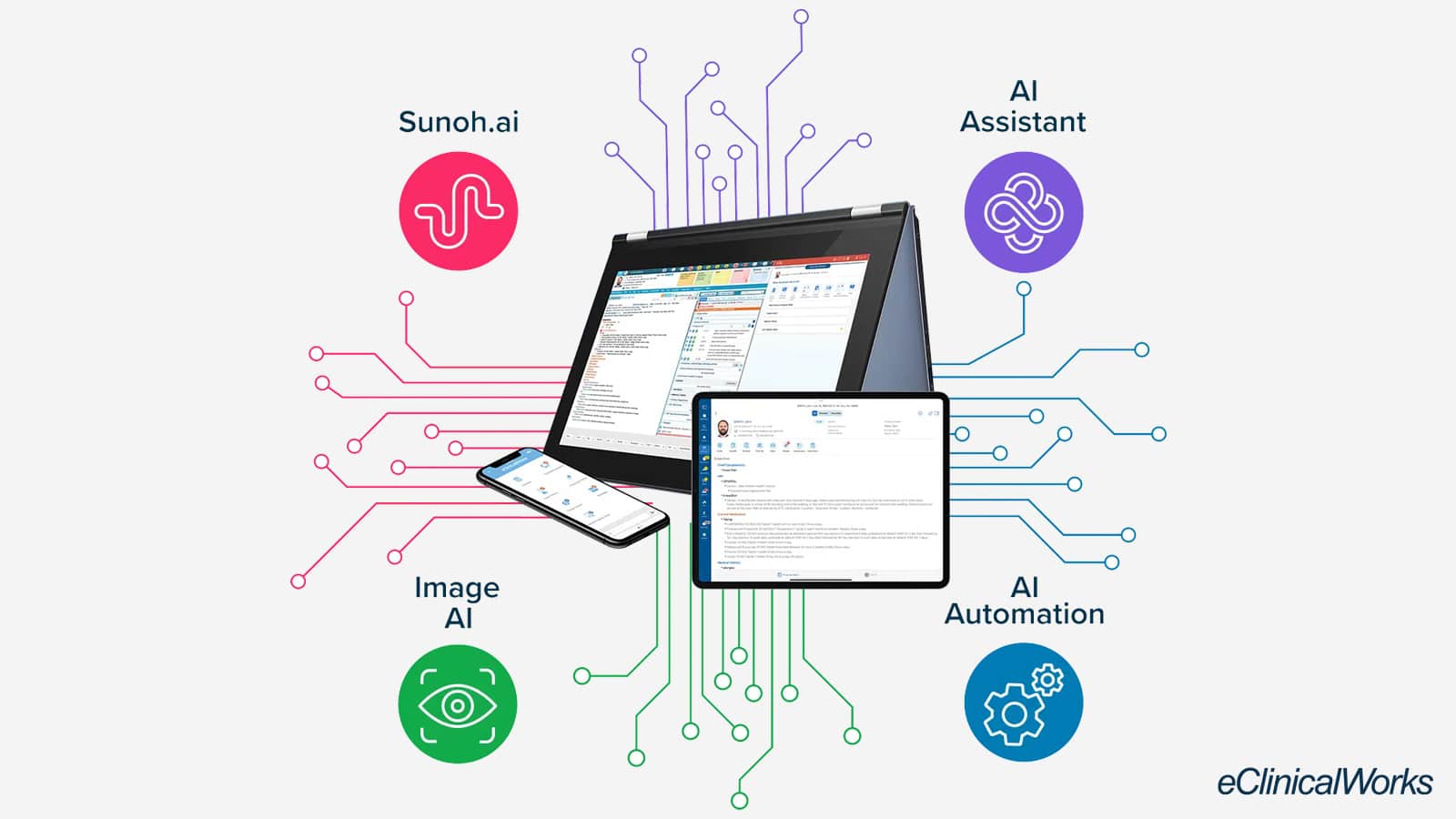Enhance Care with AI-Driven EHR and AI Medical Scribe
- 7 March 2024
- Blog
eClinicalWorks

The introduction of Artificial Intelligence (AI) to the field of medicine and its integration with Electronic Health Records (EHR) is revolutionizing healthcare. A recent study of the use of AI in healthcare, ‘Clinicians’ Views on Using Artificial Intelligence in Healthcare: Opportunities, Challenges, and Beyond’ states due to Generative AI and machine learning algorithms, healthcare data is being harnessed like never before, creating a paradigm shift in healthcare delivery.
It’s transforming and improving patient care by automating administrative tasks, enhancing patient engagement, and supporting data-driven decision-making. AI Medical Scribes are also becoming more significant in the clinical setting by taking and transcribing visit notes so you can focus on your patients.
Last year, eClinicalWorks unveiled a series of AI-powered functionalities to reshape the future of EHRs:
- ChatGPT and Generative AI integration created the industry’s first conversational EHR.
- Image AI manages inbound faxes, matches them to patients, and interprets their purpose.
- AI with Robotic Process Automation (RPA) through Automated Playlists facilitates multi-screen navigation to reduce the time spent on repetitive tasks.
- AI Assistant for PRISMA summarizes long complex medical documents like hospitalization summary.
- Sunoh.ai turns patient-doctor conversations into clinical documentation.
Creating Time for Human Connection
AI-powered documentation tools enable you to communicate with patients without distractions, creating stronger patient-provider connections. Reducing documentation tasks through AI allows you to focus on your patients, improving the overall quality of care.
Sunoh.ai helps you to gather patient information efficiently and naturally. It leverages advanced voice recognition technology to transcribe patient-provider conversations. This eliminates the need for notetaking, allowing you to focus on your patients. Advanced AI scribes can integrate into existing EHRs for a seamless transition and can understand the context of conversations, reducing errors. This saves time while improving efficiency and patient care.
Empowering Providers with Data
Data is at the heart of the digital transformation in healthcare. AI empowers you with access to extensive datasets that help inform decisions. AI allows quick access and analysis of relevant data so that you can make faster decisions for timely patient care.
Integrating ChatGPT and Generative AI with the EHR and Practice Management system brings responsible AI into healthcare. Introducing a language-based user interface streamlines the clinical workflow, from scheduling and documentation to health record search and administrative tasks. Through Automated Playlists, AI with RPA speeds up EHR navigation. AI Assistant for PRISMA – the industry’s first health information search engine – enhances interoperability and access to patient information.
AI in Remote Care
Telehealth is an excellent example of how AI scribe is transforming healthcare delivery. AI’s capability to provide real-time, personalized, and interactive healthcare services remotely highlights its transformative potential and role in shaping healthcare’s future.
Sunoh.ai, is EHR agnostic, meaning it can integrate with any EHR and telehealth solution. Sunoh uses AI to listen to, learn from, and comprehend ambient sounds. It records and analyzes verbal and non-verbal nuances and then provides recommendations to providers.
AI in Diverse Care
AI-powered EHRs meet the needs of a variety of medical specialties, including behavioral health. AI Medical Scribe technology allows you to focus on the clients’ narratives without disruptions, allowing you to provide enhanced patient-centered care. A Medical AI Scribe can record these sessions and capture details that may be missed during the visit.
The future of healthcare is exciting, with AI-driven innovation leading the way. It’s revolutionizing healthcare by reducing administrative tasks, increasing patient engagement, supporting clinical decision-making, and improving patient outcomes. With the right training and support, you can make the most of these AI advancements in a healthcare environment where the possibilities are limitless.








